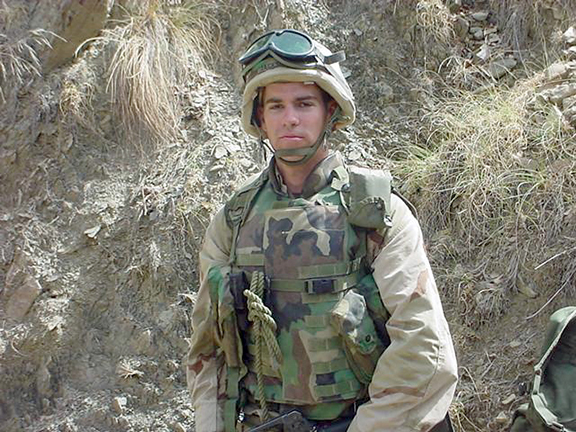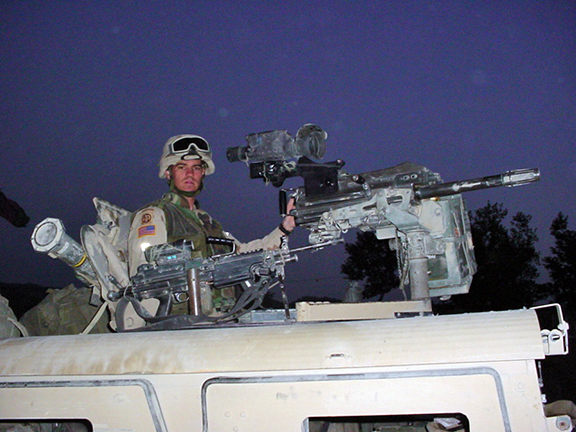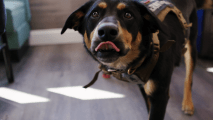One of our Superhuman episodes is both amazing and a little heartbreaking. It features Jerral Hancock, an Iraq War veteran who, in 2007, lost his left arm and suffered a paralyzing spinal cord injury when the tank he was operating in Iraq rolled over a bomb. Our episode follows Jerral as he tests out the Modular Prosthetic Limb developed by the Applied Physics Lab at Johns Hopkins University. It’s one of the most advanced bionic prosthesis in existence, and may one day change life not just for the many thousands of veterans who’ve lost parts of their bodies in Iraq, Afghanistan, and other theaters of war, but also for civilians like Johnny Matheny (who we profiled in an earlier video), who lost his left arm to cancer.
Vast numbers of the men and women who have served and continue to serve in the U.S. Armed Forces are hurting in ways we can’t see.
But as many Americans know all too well, restoring physical function is only half the battle for retired, discharged, and active duty veterans. Vast numbers of the men and women who have served and continue to serve in the U.S. Armed Forces are hurting in ways we can’t see.
First Sgt. Landon Jackson suffers from those invisible wounds. A 20-year Army veteran who’s spent his career working on an explosive ordnance disposal team (if that doesn’t sound familiar, think The Hurt Locker ), Landon had never been physically wounded during his five deployments in Kuwait, Afghanistan, and Iraq. But by 2015, he was suffering from severe post-traumatic stress disorder: Loud noises sent him into an emotional tailspin, and he experienced anxiety, depression, sleeplessness, and nightmares.

For Jackson, it got the to the point where he figured his family and friends would be better off without him. He grabbed the keys to his gun safe with the intent of ending his own life. But at the last minute, he took himself to a hospital emergency room, where he finally asked for–and received–the help he needed.
Today, Jackson helps run After the Long Walk, a 24-hour emergency hotline for retired and active-duty EOD specialists across the armed services. I called Jackson and asked him to share with Freethink readers–and anyone else who might make their way to Jerral’s story–what helped him, how veterans can help themselves and each other, and how civilians can help veterans who have sustained invisible wounds during their tours of duty.
It’s not a sign of weakness to talk about your mental health
“There are so many guys out there who need help, but they’re afraid…If you’re hurting, you can get help and keep serving.”
“I was always afraid to talk to anyone about what was going on with me, and now I can’t shut up about it. It’s why I did the interview with Soldiers magazine. If I can get other senior guys to do the same thing, the junior guys will know it’s OK to get help.”
“There are so many guys out there who need help, but they’re afraid. They think their careers are going to be over if they tell someone they need to talk. It’s just not true. If you’re hurting, you can get help and keep serving.”
It’s helpful to talk to people who know what you’ve been through

“After I lost several friends in the EOD community to suicide, I got motivated to start something for people who have been through what we’ve been through. I got with some friends and spouses in the EOD community, and we now provide a 24-hour phone line for EOD techs and their friends and family through a network called After the Long Walk. We don’t turn anyone away, but we know EOD best. Our thought process was that people are more able to open up and talk to other like-minded people. A special forces soldier might have a hard time talking to someone who doesn’t understand what they’ve been through, for instance.
“For me, I don’t want to have to spend 10-15 minutes explaining what I do. If I can call and talk to another EOD guy, I feel more comfortable talking to him. There’s a level of trust, and I’m trying to encourage other communities in the armed forces to do the same thing.”
If your community doesn’t have a specific hotline, call the National Suicide Prevention Lifeline
“Servicemembers may not think they can talk to people who haven’t experienced war, but that’s not true. If you’re in distress, calling the National Suicide Lifeline (1-800-273-8255) will help you.”
We need to find and help veterans who have fallen through the cracks
“There’s a lot of stuff for active duty, and there’s a lot of stuff for veterans through the V.A., but there’s a lot of people caught in the middle. They may have gotten out of the military but don’t have V.A. benefits, due to their time of separation or they just did a couple of years and got out. Or they may be afraid to go to the V.A. And there’s been some cases highlighted in the media where the V.A. hasn’t been able to help them.

“There are a lot of organizations that are trying to fill that gap, and one of the most effective I’ve seen is called Give an Hour. It’s basically a nationwide network of doctors, psychologists, therapists, and social workers who donate their off time to veterans and family members who need help. They’ll get them connected with free mental health services. These are military doctors and civilian doctors, but they came together to make this network. Veterans and servicemembers can call and say, ‘I need help.’”
The good news is that mental health care for servicemembers has gotten a lot better since the start of the Afghanistan and Iraq Wars
“The care I’ve received at Fort Belvoir is fantastic. That’s probably not the case for every base in the country, but I know that every branch has gotten better. There’s still a ways to go, but we’re a lot further along than we were a decade ago.
And there are ton of resources online
“For the V.A. side of things, they have a really good section of resources with descriptions. For active duty, the National Intrepid Center of Excellence is an amazing resource that I am enrolled in. It’s a traumatic brain injury clinic, but also deals with PTSD and uses a myriad of tools to help with both conditions. The main location is at Walter Reed National Military Medical Center, but satellite locations are at Fort Belvoir, Fort Bragg, Fort Hood, Fort Campbell and Camp Lejeune. They are slowly growing, and I believe the goal is to be at all major military bases eventually. It is a huge step above the normal care we get and is staffed by the best in the nation. I can’t say enough about what they have done for me.”



